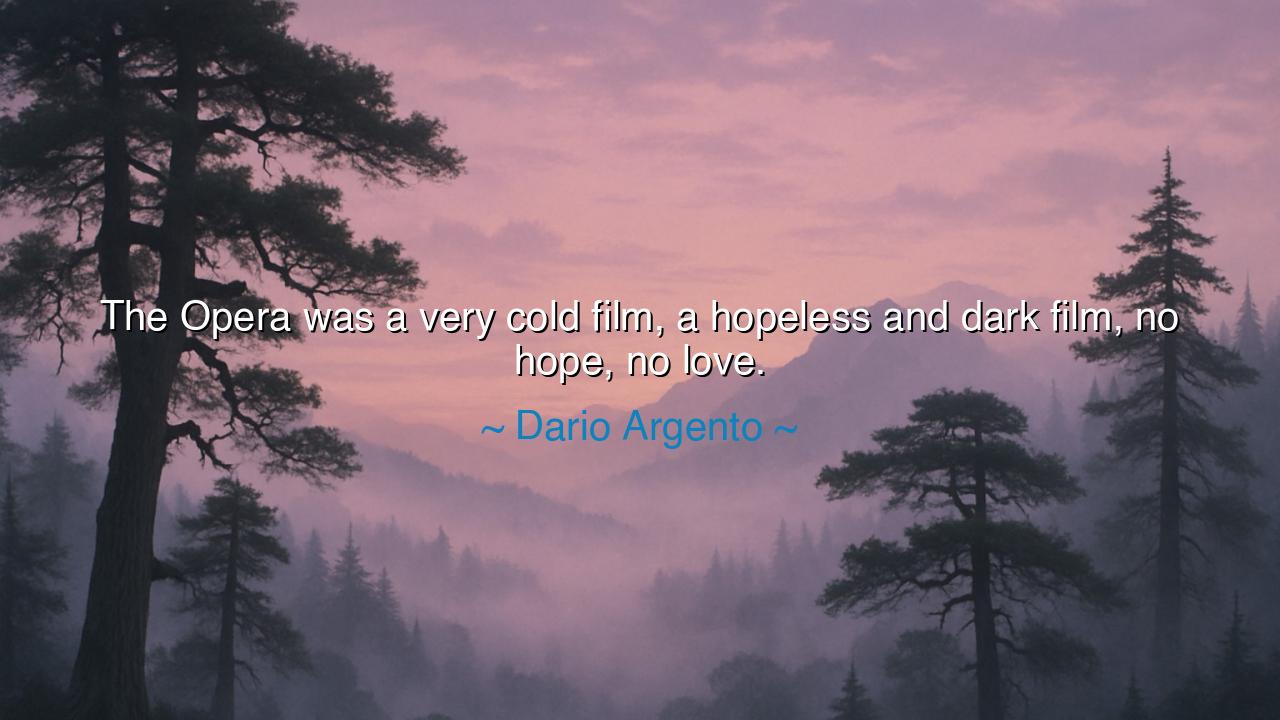
The Opera was a very cold film, a hopeless and dark film, no






The words of Dario Argento — “The Opera was a very cold film, a hopeless and dark film, no hope, no love.” — are the confession of an artist who has gazed into the abyss of his own creation and found only shadows staring back. They are not the complaint of a weary man, but the sober reflection of a visionary who understood that art sometimes mirrors not the light of the world, but its darkness. In this single statement, Argento — master of Italian horror, poet of fear — captures a truth as ancient as tragedy itself: that there are times when beauty must pass through darkness, and when the artist, to reveal truth, must walk through the cold chambers of despair.
To understand the meaning of this quote, one must know the film from which it springs — “Opera” (1987) — a work drenched in dread and suffused with cruelty, where beauty and horror dance as one. Argento, a master of the giallo tradition, made this film during a time of personal turmoil, after betrayal and death had shaken his spirit. The result was not a tale of salvation, but one of corruption and suffering, where art itself becomes the instrument of torment. When he calls it “cold,” he is not speaking only of its atmosphere, but of its soul — for “Opera” is a meditation on obsession, on art divorced from love, on creation stripped of mercy. It is, in essence, a mirror held to the darker side of the human heart — that place where beauty, once worshiped, becomes a weapon.
Argento’s words also echo the lament of countless artists before him who found that genius is not always born of joy, but of anguish. The ancient tragedians knew this well. Euripides, in his plays, filled the stage not with heroes triumphant, but with souls broken by fate, revealing that wisdom often comes through suffering. Likewise, Michelangelo, in his later years, spoke of his sculptures as “wrestlings with stone,” where every chisel strike was both creation and destruction. Argento, too, wrestled with his material — painting his visions not in sunlight, but in shadow. “No hope, no love,” he says, and yet in those words, there lies a paradoxical kind of truth: that even hopeless art bears witness to the soul’s capacity to feel, to express, to endure.
When Argento calls his film “hopeless and dark,” he is also speaking of the world as he saw it — a world in which innocence is fragile, and beauty itself is hunted. His cinema, like the tragedies of Sophocles or the symphonies of Mahler, is not designed to comfort, but to awaken. It strips away illusion so that we may see the cost of our desires, the fragility of our dreams, and the violence that often hides behind elegance. The opera within his film — filled with music, art, and grandeur — becomes a stage of suffering, where art no longer redeems, but devours. This, too, is an ancient idea: that when humanity loses its connection to love, even its greatest creations turn monstrous.
Yet, in his bleakness, there is still a kind of truth that saves. For to name despair honestly is to begin to transcend it. The poet Dante, when descending into Hell, does not look away; he records every horror, every torment, every sin — and only then does he rise toward the light of Paradise. So too does Argento’s art serve as a descent, not for its own sake, but as a way to reveal what lies beneath the surface of civility. In this sense, the “coldness” of his film is not lifelessness, but clarity — a mirror that shows humanity as it is, unguarded and unadorned. Sometimes, to heal, one must first face the wound; sometimes, to rediscover hope, one must first understand its absence.
From this understanding, we can draw a lesson both artistic and spiritual: that not all creation must be beautiful to be meaningful. There are times when truth wears the mask of darkness, and the artist’s duty is not to soothe the world, but to wake it from its dream. Argento’s words remind us that art can be both cruel and sacred, that even in hopelessness, there is a kind of purity — for to see the world without illusion is the beginning of wisdom. His “cold film” is not the death of feeling, but the moment before rebirth — the silence before the storm breaks, the shadow before dawn.
Thus, let us remember this: when we encounter darkness, whether in art or in life, we must not shrink from it. For the darkness reveals the outlines of what we truly are. “No hope, no love,” says Argento — but it is only through knowing such absence that we can understand the value of hope and love when they return. The ancients would have called this the catharsis — the purging of the soul through terror and pity. So let us not fear the artist who paints the abyss, nor the art that chills us, for through them we learn to cherish the light. In the coldness of Argento’s vision, we find not despair, but a warning: that without compassion, beauty turns to cruelty; without love, creation becomes torment; without light, art — and life — lose their warmth. And so his words stand as both lament and lesson — that from the coldest truth, the fire of wisdom is kindled.






AAdministratorAdministrator
Welcome, honored guests. Please leave a comment, we will respond soon